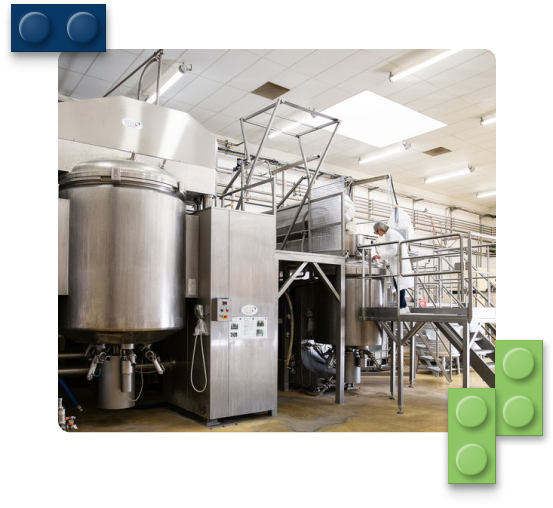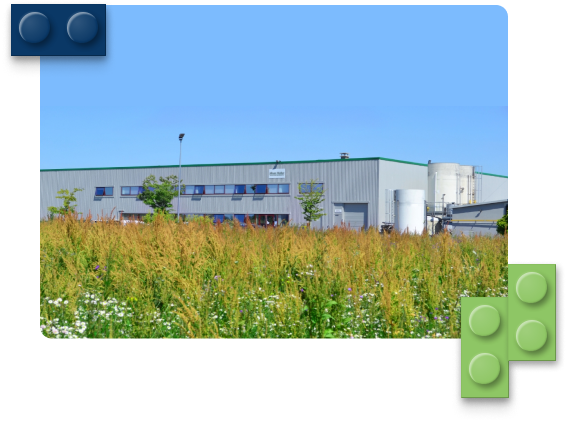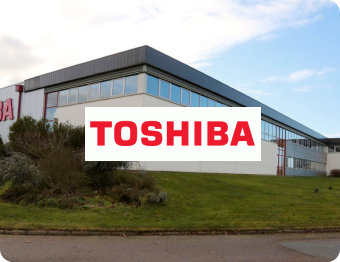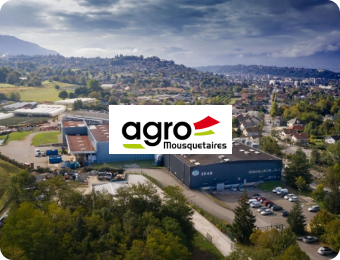Waste heat recovery at Alban Muller
Alban Muller: reducing carbon emissions by 50% by 2030
Cosmetics maker Alban Muller wants to halve its carbon emissions
by 2030. To meet this huge challenge, Dametis sent its experts on site in order
to examine and define the priority axes of intervention.
In the space of 2 years, Dametis has already enabled Alban Muller to reduce by 82%
its gas consumption for the production of domestic hot water thanks to the recovery
of fatal heat on its cold groups.
RESULTS
The results enabled by waste heat recovery
reduction in gas consumption within the scope of domestic hot water production thanks to the recovery of waste heat on the cold units, i.e. more than the initial objective of 80%.
per year in potential savings with simple adjustments and zero investment. The figure rises to €280,000 for minor work, and €330,000 for major investments.
per year in potential savings with simple adjustments and zero investment. The figure rises to 330 tonnes with light work and 410 tonnes with heavier investment.
CONTEXT
Alban Muller, production of cosmetics of natural origin
Alban Muller manufactures products based on natural ingredients for the cosmetics and pharmaceutical industries.
The R&D laboratory and the production site are located in Fontenay-sur-Eure, in the heart of Cosmetic Valley. This is where the Alban Muller teams develop solutions based on plant extracts and tested active ingredients in order to offer natural alternatives to synthetic products.
Alban Muller in a few figures
85
employees on site
16 M €
annual turnover for the factory
1978
Established in Fontenay-sur-Eure for nearly 35 years
2021
Integration into the British group Croda International
The site consists of 2 buildings
Building Pharmaceutical
Building dedicated to the manufacture of pharmaceutical and nutraceutical products based on plant extracts.
Building Cosmetics
This is where cosmetic ingredients of natural origin and care products for the face, body and hair are made.
Long-term support
Project kickoff
Alban Muller contacts Dametis and becomes the very first customer in Dametis history.
First mission
Replacement of chillers and recovery of waste heat
MyDametis
Implementation of MyDametis to monitor chiller performance in real time.
New carbon target
Croda acquires Alban Muller. The Group is aiming for a 50% reduction in carbon emissions by 2030.
First great success
Mission accomplished, with 82% savings on domestic hot water production.
Second mission
Launch of 2nd mission: on-site energy audit, data collection, measurement plan.
Master plan
Implementation of a decision matrix indicating the actions to be taken to reduce CO2 emissions.
CHALLENGES / SOLUTIONS
Heat recovery fatal to decarbonization
Replacing chillers and recovering waste heat
Chillers are essential to regulate the temperature of machines and production circuits. Those at the Alban Muller plant needed to be replaced to improve the energy performance of the plant.
Furthermore, the Alban Muller teams had identified a significant heat loss. Indeed, there was no system in place to recover waste heat from the chillers.
Alban Muller set a goal to reduce CO2 emissions resulting from heat loss by 80%.

Cooling units replacement and heat recovery
with MyProject
The Alban Muller site called on Dametis to replace the cooling units and implement a more efficient heat recovery system.
The solutions provided by Dametis have led to 81.92% savings in 2 years on the gas bill for the hot water production area, exceeding the 80% target.


Multiple drifts that reduce energy performance
Once the cold groups have been replaced and the heat recovery system optimized, how to prevent energy drifts from occurring again in the future? This is the second challenge faced by the Alban Muller plant.

Preventing any future drift thanks to MyDametis
MyDametis allows to monitor the performance of chillers and heat recovery in real time.
To prevent any future drift, setting up alarms enables the automatic sending of alerts as soon as a variable crosses a given threshold.
Challenge: Reduce carbon emissions by 50% by 2030
In March 2021, Alban Muller joined Croda International. The British chemical and cosmetics group has set ambitious decarbonization goals for its factory production.
Using 2018 CO2 emissions as a reference point, Croda International aims to reduce emissions by 50% by 2030 and 100% by 2050.
These goals target on-site direct emissions such as gas consumption and company vehicles (scope 1), as well as indirect energy-related emissions, particularly electricity consumption (scope 2).

Optimizing processes to improve performance with MyExpertise
- During the initial visit, Dametis experts conducted an energy audit, inventoried the factory's equipment, and collected as much data as possible on gas and electricity consumption. After measuring the performance gaps between the current factory processes and their optimal levels, they proposed improvement areas to reduce CO2 emissions zone by zone.
- During a second on-site visit, Dametis experts established a measurement plan and identified where to place sensors to enhance performance. For areas with insufficient data collection, they defined additional measurements to be taken to obtain relevant quantitative analysis.
- MyExpertise implemented an action plan based on a decision matrix that helps prioritize intervention areas according to potential return on investment and implementation difficulty.
- Dametis offers long-term energy support with follow-up on the action plan and dedicated studies on high-potential energy reduction points identified during the audit.

RESULTS
Results in figures
reduction in gas consumption for domestic hot water production thanks to heat recovery from chillers, exceeding the initial target of 80%.
per year in potential savings with simple adjustments and zero investment. The figure rises to €280,000 for minor work, and €330,000 for major investments.
per year in potential savings with simple adjustments and zero investment. The figure rises to 330 tonnes with light work and 410 tonnes with heavier investment.
And your environmental transition,
shall we begin?
Dametis supports manufacturers like you in their transition
by controlling their consumption of energy, water and materials.
Book a call with an industry expert to discuss the challenges of
your industrial sites.











